

Partage du travail, création monétaire, revenu de vie : En ces temps de pessimisme général, voici deux visions filmées de pistes économiques pour une sortie de crise "vers le haut" émanant de deux personnages croisés récemment...
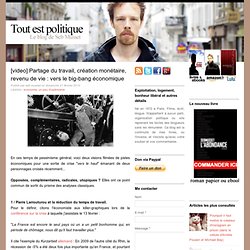
Opposées, complémentaires, radicales, utopiques ? Elles ont ce point commun de sortir du prisme des analyses classiques. 1 / Pierre Larrouturou et la réduction du temps de travail. Faut-il partager le travail pour résoudre le chômage de masse ? Specialization and the New Economy. The concept of life-long employment as a specialist in a single company comes from a time when the relationship between an employee and an employer could be measured in decades until retirement.
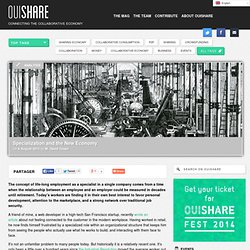
Today’s workers are finding it in their own best interest to favor personal development, attention to the marketplace, and a strong network over traditional job security. A friend of mine, a web developer in a high-tech San Francisco startup, recently wrote an article about not feeling connected to the customer in the modern workplace. Having worked in retail, he now finds himself frustrated by a specialized role within an organizational structure that keeps him from seeing the people who actually use what he works to build, and interacting with them face to face.
It’s not an unfamiliar problem to many people today. But historically it is a relatively recent one. Falling Barriers to Entry Stories like my friend’s highlight some of the problems with that arrangement. Specialization and Insecurity. Are jobs obsolete? Douglas Rushkoff: U.S.
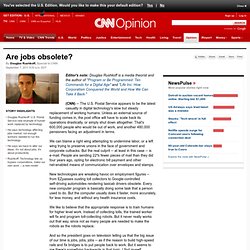
Postal Service new example of human work replaced by technologyHe says technology affecting jobs market; not enough workers needed to run the technologyHe says we have to alter our ideas: It's not about jobs, it's about productivityRushkoff: Technology lets us bypass corporations, make our own work -- a new model Editor's note: Douglas Rushkoff is a media theorist and the author of "Program or Be Programmed: Ten Commands for a Digital Age" and "Life Inc: How Corporatism Conquered the World and How We Can Take it Back. " (CNN) -- The U.S. Postal Service appears to be the latest casualty in digital technology's slow but steady replacement of working humans. Unless an external source of funding comes in, the post office will have to scale back its operations drastically, or simply shut down altogether. We can blame a right wing attempting to undermine labor, or a left wing trying to preserve unions in the face of government and corporate cutbacks.
Fixing the Digital Economy. Le futur du travail dans l’entreprise (2/2) : … sans l’entreprise. Le numérique sape les fondements historiques de « l’entreprise ».
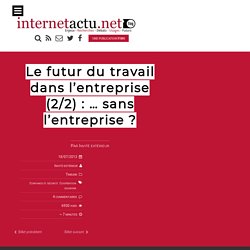
Hors de celle-ci, point de travail ? L’entreprise n’a pourtant pas toujours existé en tant que telle ni dans sa forme actuelle, c’est une construction sociale… dont le numérique déstabilise les fondations. Car, aujourd’hui, les « nouvelles technologies » ne sont plus seulement des outils à son service, elles constituent aussi de nouveaux moyens de production, de mesure de la valeur et de rétribution.
Est-ce au point de déconnecter radicalement le travail de l’entité « entreprise » ? Cette question était au coeur des échanges sur l’avenir du travail, lors du dernier festival Futur en Seine. Les machines prennent-elles le travail ? Deux chiffres édifiants appuient cette vision : Bien sûr, les activités et productions de Kodak et Instagram ne sont pas vraiment comparables, pas plus que General Eletric ne l’est avec les géants de l’internet. TEDxParis 2011 - Nicole Turbé-Suetens - Télétravail d'avenir.
Le Monde du Travail dans 20 ans ? Jaron Lanier: 'The online Utopia doesn't exist. We need to reboot' This article was taken from the April 2013 issue of Wired magazine.
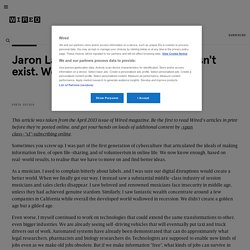
Be the first to read Wired's articles in print before they're posted online, and get your hands on loads of additional content by subscribing online. Sometimes you screw up. I was part of the first generation of cyberculture that articulated the ideals of making information free, of open file-sharing, and of volunteerism in online life.
We now know enough, based on real-world results, to realise that we have to move on and find better ideas. As a musician, I used to complain bitterly about labels, and I was sure our digital disruptions would create a better world. Even worse, I myself continued to work on technologies that could extend the same transformations to other, even bigger industries. Why did the ideal of open sharing fail? Companies such as Google and Facebook arose to organise all the information freely shared by ordinary people, but the result is not widespread employment. Work and the Internet. For context about why I care, here is a slight paraphrasing from grant proposal I recently wrote: For the last eight years, I have been working to develop an area of computer science called "human computation," which studies how to harness the combined power of humans and computers to solve problems that would be impossible for either to solve alone.
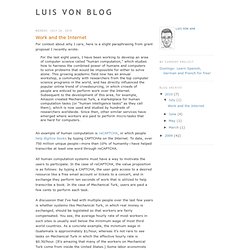
This growing academic field now has an annual workshop, a community with researchers from the top computer science programs in the world, and has directly influenced the popular online trend of crowdsourcing, in which crowds of people are enticed to perform work over the Internet. Subsequent to the development of this area, for example, Amazon created Mechanical Turk, a marketplace for human computation tasks (or “human intelligence tasks” as they call them), which is now used and studied by hundreds of researchers worldwide.